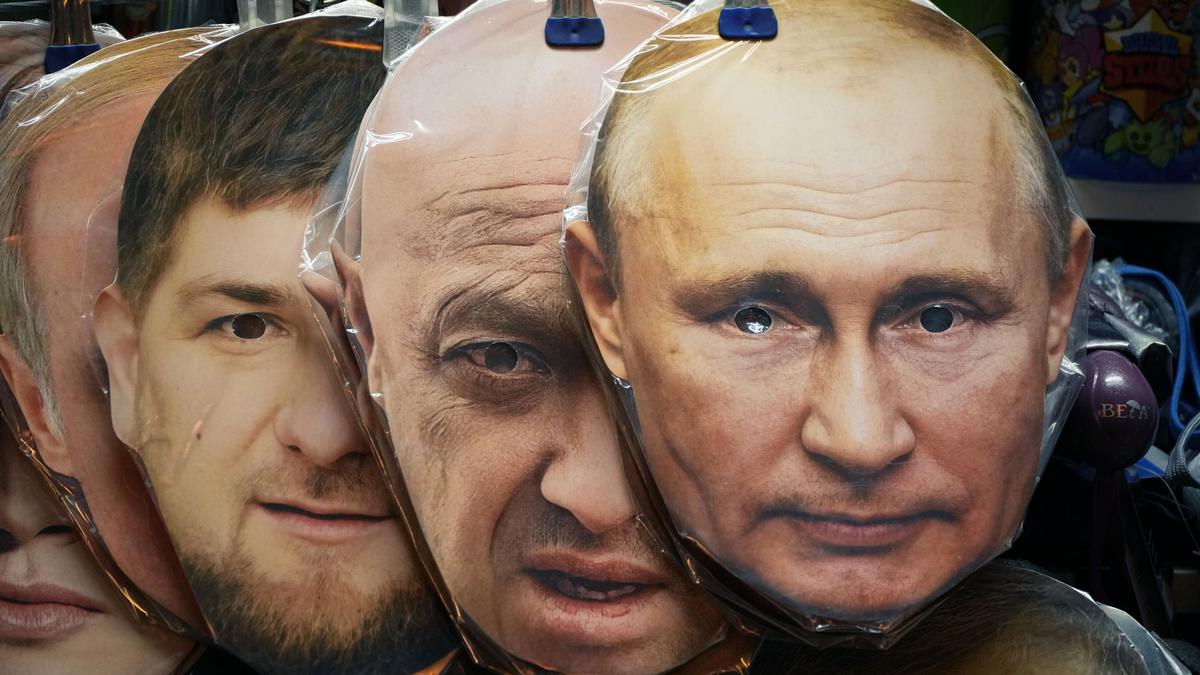
Mutiny exposes chinks in Putin’s armoured regime Premium
The Hindu
June 24th (Saturday) was marked by not just the biggest threat to Vladimir Putin’s hold on power but also a public display of betrayal by a former trusted ally, Yevgeny Prigozhin, the head of the Wagner Private Military Company
In an interview in 2018, Vladimir Putin was asked if he’s a forgiving person. He said yes, “but not everything’. The reporter asked him what was impossible for him to forgive. “Betrayal,” was the quick reply. For the former KGB operative who has been at the helm of Russia for more than two decades, June 24th (Saturday) was marked by not just the biggest threat to his hold on power but also a public display of betrayal by a former trusted ally. Yevgeny Prigozhin, the head of the Wagner Private Military Company, launched a “march for justice” towards Moscow after his mercenaries took over the Southern Military District and some other administrative buildings in Rostov-on-Don.
Mr. Prigozhin, a former Kremlin contractor who set up Wagner with the consent and support from Mr. Putin, demanded the dismissal of Russia’s military leadership, particularly Defence Minister Sergei Shoigu and the Chief of General Staff Valery Gerasimov, who is also the commander of the “special military operation”, as the Russian invasion of Ukraine is called by Moscow. Mr. Prigozhin blames the “corrupt” and “incompetent” Ministry of Defence leadership for Russia’s poor performance in the Ukraine war. But by taking over a military command and launching a march towards Moscow with tanks and other weapons, at a time when Russia is trying to repel the Ukrainian counteroffensive along the over 1,000-km-long frontline, Mr. Prigozhin was effectively challenging his former boss, the man in the Kremlin.
As the crisis was unfolding before the whole world, Mr. Putin came on TV, calling the Wagner move a “betrayal” and a “stab in the back”. He also said he had ordered the Russian troops to crush the mutiny. But Wagner faced no major resistance from the regular Russian troops when its mercenaries were marching along the M-4 state highway. That was because what Mr. Putin did after threatening action was to turn to Alexander Lukashenko, the Belarus President and a long-time ally, to negotiate with the man who betrayed. By Saturday night, Belarus announced that Wagner would turn around from its march and leave the buildings they occupied in the south, averting a major crisis. Immediately after that, Mr. Prigozhin released a video on the Wagner Telegram channel, saying “it’s over”.
Mr. Prigozhin had particular demands: Wagner should be protected; he should get immunity (authorities had slapped him with criminal charges after the mutiny began) and Minister Shoigu and Gen. Gerasimov should be sacked. Full details of the deal Mr. Lukashenko struck with the Wagner are still not available. But later in the night, Dmitry Peskov, the Kremlin spokesman, said the criminal case against Mr. Prigozhin would be dropped and that “he will leave for Belarus”. The Wagner fighters who did not join the mutiny would sign contracts with the Ministry of Defence and those who joined the mutiny would not be prosecuted. There were rumours in Russian Telegram channels that the top military brass would be fired, but Mr. Peskov said “personnel changes in the MoD were not discussed”.
On the face of it, Mr. Prigozhin accepted concessions after launching a rebellion for his own safety. This also provides an opportunity for Russia to splinter and integrate the Wagner into the regular Russian command structure. And it is to be seen whether the fate of M/s Shoigu and Gerasimov is hanging in balance especially as criticism of the way the war is conducted is mounting at home. But at the same time, the whole drama exposed Mr. Putin’s loosening grip over a system which he himself helped build and managed tightly over the past 20 years.
Also read | As Ukrainian attacks pick up inside Russia, the war is coming home for Putin
Mr. Putin likes to show his fellow Russians the world that he’s clearly in command as a televised national security council meeting before the war began showed — Mr. Putin was seen taking suggestions, giving orders and raising questions to his top brass showing everyone that he is the boss. Yet, Mr. Prigozhin’s mutiny challenged the idea of stability and control. True, Mr. Putin avoided a civil war through negotiations. But a private military group marching on a state highway towards the capital with weapons at a time when the country is fighting its largest war with an external enemy since the end of the Second World War is not something that’s expected in a cohesive, stable, orderly state.











